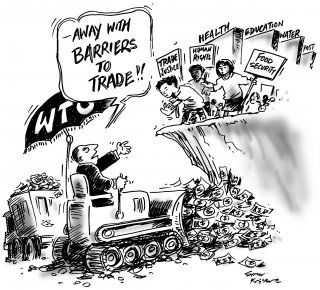 Originally GATT merely aimed to reduce tariffs on manufactured goods. In doing so it recognised that developing countries still needed to retain some tariff protection whilst they developed and some preferential treatment for entry into the markets of industrialised nations.
Originally GATT merely aimed to reduce tariffs on manufactured goods. In doing so it recognised that developing countries still needed to retain some tariff protection whilst they developed and some preferential treatment for entry into the markets of industrialised nations.
However the Uruguay Round went far beyond, in both power and scope, the limited objectives of lowering tariffs on manufactured goods. Pressured by transnational corporations, negotiators from the US and the EU sought to include services, intellectual property rights and investment rights as part of GATT despite the opposition of developing nations.
The GATT was a favoured forum for business interests to achieve international rule changes because it was dominated by trade ministries and officials who were sympathetic to business concerns.
 Although the US initiated the push for free trade through GATT, by the 1990s Europe was also a major driver of a GATT’s free trade agreement. Leon Brittan (pictured), an EU Trade Commissioner at the time, has since argued that ‘The reality, as opposed to the myth, is that Europe has evolved, and is increasingly evolving, in the direction of free markets and free trade.’ However the concept of ‘evolution’ as a natural and inevitable process disguises the lobbying and PR efforts and power exercised to achieve that ‘evolution’.
Although the US initiated the push for free trade through GATT, by the 1990s Europe was also a major driver of a GATT’s free trade agreement. Leon Brittan (pictured), an EU Trade Commissioner at the time, has since argued that ‘The reality, as opposed to the myth, is that Europe has evolved, and is increasingly evolving, in the direction of free markets and free trade.’ However the concept of ‘evolution’ as a natural and inevitable process disguises the lobbying and PR efforts and power exercised to achieve that ‘evolution’.
In fact Brittan says of his own role: ‘I like to think that my work bulldozing through reforms which levered open markets, intensified competition and put public sector monopolists on the back foot, contributed to changing the terms of the debate.’ He is particularly proud of being able to head off ‘social regulatory burdens’, that is regulations that sought to achieve social goals.
The Uruguay Round of talks began in 1986 in Uruguay with 108 countries represented. Business leaders hoped that the Uruguay Round would achieve further significant reductions and also address non-tariff barriers to trade.
Although the Uruguay Round was due to end in 1990, it foundered over a lack of agreement about reductions in protection for agriculture, particularly in Europe, and also conflict over US efforts to extend the agreement to cover services. Business from both sides of the Atlantic lobbied hard.
The OECD ministerial meeting in 1991 stated that ‘the Uruguay Round has the highest priority on the international economic agenda’.
Extensive business lobbying was required to end the Uruguay Round and get agreement on GATT. Then more business lobbying and public relations was needed to get GATT approved in the US congress. In early 1995 the World Trade Organisation (WTO) was set up to administer GATT.